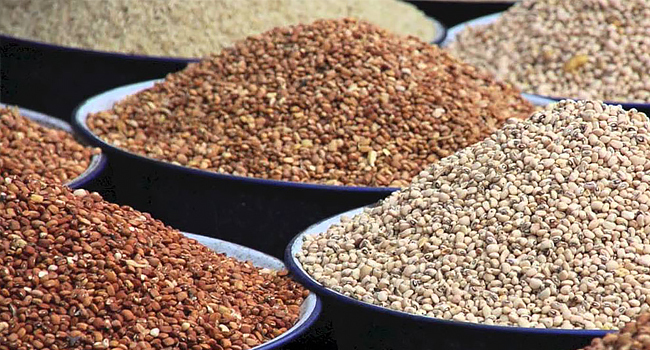Business
Food Inflation: Beans Now Out of Reach, Says Rewane

Economic expert Bismarck Rewane highlights the impact of rising food inflation in Nigeria, noting that beans, a staple food, is now unaffordable for many citizens. Learn more about the economic challenges.

Bismarck Rewane, the Managing Director of Financial Derivatives Company Limited, noted that although prices for other food commodities have slightly decreased in recent days, bean prices have risen considerably.
Rewane mentioned this on the Business Morning segment of Channels Television’s Sunrise Daily breakfast program on Thursday.
“We’ve observed a significant decrease in onion prices to N115,000 and rice has also dropped to N110,000 from its previous high of N120,000. The surprising commodity for everyone is beans; it has become scarce both in storage and availability,” he said.
Based on our correspondent’s market research, traders sold a paint rubber of beans for N13,000 and a derica for N3,000. Meanwhile, the price of a bag of beans reached up to N180,000.
The economist attributed the increase in bean prices to recent flooding that devastated food-producing states such as Borno, Bauchi, and Sokoto, among others.
“Flooding has resulted in significant destruction of goods,” Rewane stated, noting that the expenses involved in transporting agricultural products from farms to markets have increased as well, following a recent rise in petrol prices — climbing from approximately N600 to about N1,000 per litre.
The economist anticipated a rise in food inflation over the coming weeks but remained hopeful that duty waivers on incoming imported commodities would help stabilize prices.
“Currently, despite the circumstances, we believe inflation will continue to rise. In particular, food inflation is expected to increase; overall headline inflation may reach 34%, though this is anticipated to be temporary. Once imported commodities benefiting from duty waivers arrive in the country, prices should begin to decrease,” Rewane stated.
READ ALSO: FG’s Revenue Up, Food Inflation Slows: Positive Signs for Economy
On October 1, 2024, President Bola Tinubu announced that his administration is dedicated to restoring peace in the troubled northern regions. This initiative aims to allow farmers displaced by banditry and kidnappings to return to their lands and boost food production.
“We anticipate a significant increase in food production and a decline in food costs. I assure you, we will not waver on this commitment,” Tinubu stated during his 2024 Anniversary Broadcast commemorating Nigeria’s 64th Independence Day.
Historic Surge in Food Prices
Nigeria is currently facing a severe economic crisis, marked by increasing costs of living and energy. This situation has been triggered by two government policies enacted in May 2023: the removal of petrol subsidies and the unification of foreign exchange windows.
In August, discontented youths demonstrated against hunger and economic challenges for the first ten days of the month. According to recent data from the National Bureau of State Statistics (NBS), the country’s inflation rate reached 32.15% in August.
According to the NBS, the food inflation rate in August 2024 was 37.52% year-on-year, which is an increase of 8.18 percentage points from the rate of 29.34% recorded in August 2023.
It linked the rise in food inflation on a year-on-year basis to price increases in bread, maize, grains, guinea corn, cereals, yam varieties like Irish potatoes and water yam, cassava tuber products such as palm oil and vegetable oil.
The Tinubu administration, in collaboration with governors from the 36 states, has introduced various palliative measures. However, Nigerians remain deeply affected by the harsh impact of inflation, as food and basic commodity prices continue to rise uncontrollably.
